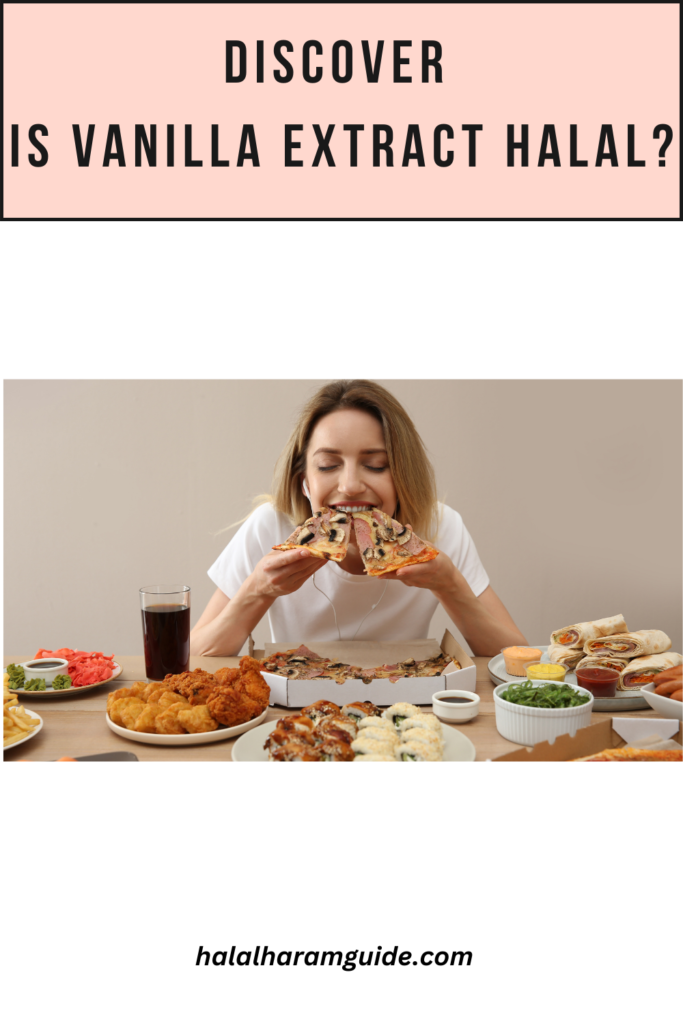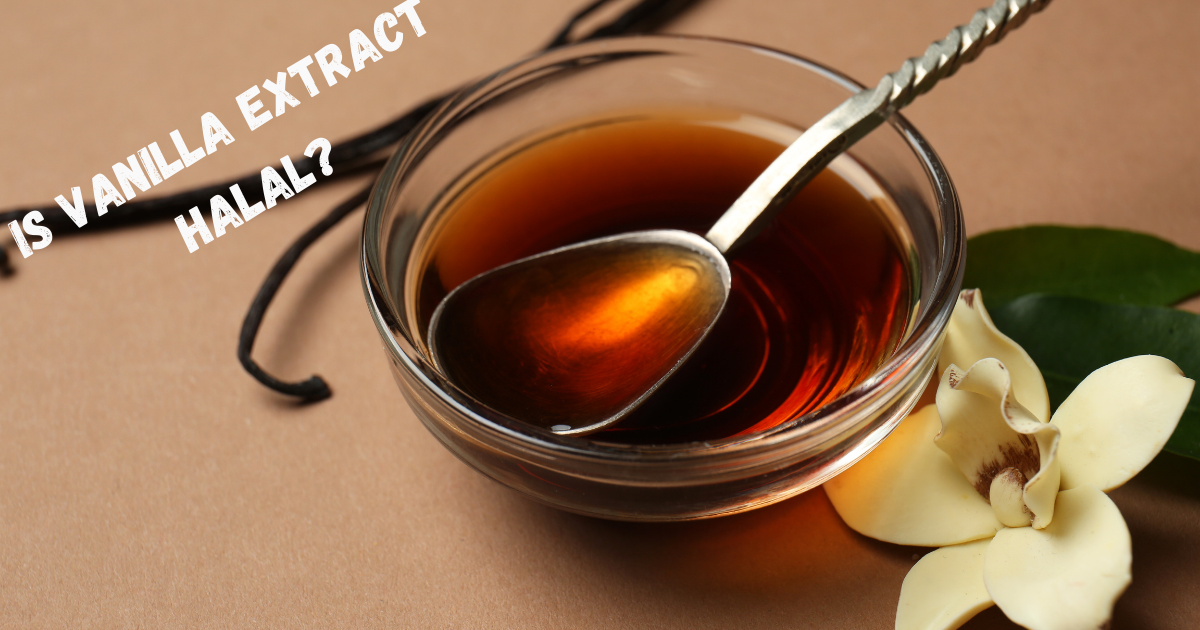Welcome to our blog post on ” Is Vanilla Extract Halal.” If you’ve ever wondered about the halal status of vanilla extract and its suitability for your dietary preferences, you’re in the right place.
We’ll delve into the world of vanilla extract, explore what makes it halal, and provide you with insights on choosing the best halal-certified options. Let’s get started!
What is vanilla extract?
Vanilla extract is a concentrated liquid flavoring derived from vanilla beans. It is created by macerating vanilla beans in alcohol and water, extracting the aromatic compounds and flavors from the beans.
This process results in a rich, sweet, and aromatic liquid that is widely used in baking, cooking, and various food and beverage preparations to impart the distinctive and beloved flavor of vanilla.
Types of vanilla extract
There are primarily two types of vanilla extract:
- Pure Vanilla Extract
- Made from natural vanilla beans, alcohol, and water. It contains no artificial additives and is considered the most authentic and flavorful type.
- Imitation Vanilla Extract
- Made using synthetic vanillin, a compound that mimics the flavor of vanilla. It is more affordable than pure vanilla extract but lacks the complexity and depth of flavor found in the natural counterpart.
Uses of vanilla extract
- Baking: Vanilla extract is a staple in baking recipes, such as cakes, cookies, muffins, and pastries, where it enhances the flavor and aroma of the baked goods.
- Desserts: It’s often used in custards, puddings, ice creams, and other sweet treats to add a rich and delightful vanilla taste.
- Beverages: Vanilla extract is added to drinks like coffee, hot chocolate, milkshakes, and smoothies to infuse them with a warm and comforting flavor.
- Sauces and Syrups: It can be incorporated into sauces, syrups, and toppings to elevate the taste of pancakes, waffles, and fruit dishes.
- Savory Dishes: In some cuisines, vanilla extract is used sparingly in certain savory dishes, such as marinades for meats, to add a unique depth of flavor.
- Homemade Extracts: It serves as a base for making other flavored extracts, like almond or coconut extract, at home.
How vanilla extract is made?
- Harvesting: Vanilla beans are harvested from the vanilla orchid plant when they are fully mature. The vanilla orchid flowers are hand-pollinated, and the beans (pods) develop over several months.
- Blanching: After harvesting, the vanilla beans are blanched in hot water to stop the natural enzymatic process and kill any bacteria on the beans.
- Fermentation: The blanched vanilla beans are then wrapped in blankets or placed in boxes to undergo a fermentation process. This step is crucial as it helps develop the characteristic vanilla flavor and aroma.
- Drying: The beans are dried to reduce their moisture content and prevent mold growth. This drying process can take several weeks.
- Extraction: Once the vanilla beans are fully cured, they are ready for extraction. The cured beans are placed in a mixture of alcohol and water. The alcohol serves as a solvent to extract the flavor compounds from the beans.
- Aging: The mixture of alcohol, water, and vanilla beans is stored in a dark and cool place to age. During this period, the alcohol extracts the flavors and aromas from the beans, resulting in a concentrated vanilla-infused liquid.
- Filtration: After sufficient aging, the vanilla extract is filtered to remove any solid particles, leaving behind a clear liquid.
- Bottling: The filtered vanilla extract is then bottled, and the final product is ready for commercial distribution or personal use.
Is Vanilla Extract Halal Or Haram?
The halal status of vanilla extract depends on how it is produced. Traditional vanilla extract is made by macerating vanilla beans in alcohol, and this alcohol is usually derived from fermented grains or grapes. In Islamic dietary guidelines, the consumption of alcohol is considered haram (forbidden). Therefore, vanilla extract made with alcohol derived from grapes or grains would be considered haram.
However, there are halal-friendly alternatives available in the market. Some manufacturers produce vanilla extract using alcohol derived from halal sources, such as sugar cane or corn. Additionally, there are alcohol-free vanilla extracts made using other solvents, such as glycerin or propylene glycol.
| Type of Vanilla Extract | Alcohol Source | Halal Status | Additional Information |
| Traditional Vanilla Extract | Grapes or Grains | Haram (Not Halal) | Contains alcohol from haram sources |
| Halal-Certified Vanilla Extract | Sugar Cane or Corn | Halal | Certified as halal by recognized authority |
| Alcohol-Free Vanilla Extract | No Alcohol | Halal | Made with non-alcoholic solvents |
| Homemade Vanilla Extract | No Alcohol | Halal | Prepared without using any alcohol |
Is Vanilla Extract halal if used in food preparation?
Whether vanilla extract is halal or not depends on its production process and the source of alcohol used in its making. If the vanilla extract is made using alcohol derived from halal sources, such as sugar cane or corn, and contains no haram (forbidden) ingredients, it is considered halal.
However, if the vanilla extract contains alcohol from grapes or grains, it would be considered haram and not permissible in Islamic dietary guidelines.
Is Vanilla Extract With Alcohol Halal?
in Islamic dietary guidelines, the consumption of alcohol is generally considered haram (forbidden). Therefore, vanilla extract made with any type of alcohol, regardless of its source, would be considered haram and not halal.
Is Vanilla Extract In Chocolate Halal?
The halal status of vanilla extract in chocolate depends on how the chocolate is produced and what ingredients are used. If the chocolate is made with halal-certified vanilla extract or with alcohol-free vanilla flavoring, then it would be considered halal and permissible for consumption in Islamic dietary guidelines.
Does Vanilla Extract Contain Alcohol?
Yes, traditional vanilla extract does contain alcohol. Vanilla extract is made by macerating vanilla beans in a mixture of alcohol and water. The alcohol serves as a solvent to extract the flavor compounds and aromas from the vanilla beans, resulting in a concentrated vanilla-infused liquid. The alcohol content in vanilla extract is typically around 35% to 40%.
As a result of the alcohol content, vanilla extract is not considered halal in Islamic dietary guidelines if the alcohol is derived from haram (forbidden) sources, such as grapes or grains. However, there are halal-certified vanilla extracts available that use alcohol from halal sources, such as sugar cane or corn, or alcohol-free alternatives made with other solvents.
Halal Or Alcohol-Free Vanilla Extract Options
- Halal-Certified Vanilla Extract
- Look for vanilla extract that is explicitly labeled as “halal-certified.” These products are produced using alcohol derived from halal sources, such as sugar cane or corn, and are suitable for consumption according to Islamic dietary guidelines.
- Alcohol-Free Vanilla Extract
- Seek out alcohol-free vanilla extract, which is made using alternative solvents like glycerin or propylene glycol. These extracts do not contain any alcohol and are suitable for those who prefer alcohol-free options or have specific dietary restrictions.
- Homemade Vanilla Extract
- You can also make your own alcohol-free vanilla extract by using glycerin or another non-alcoholic solvent. This way, you have complete control over the ingredients and can ensure it meets your halal or alcohol-free requirements.
Conclusion
In conclusion, the permissibility of using vanilla extract with alcohol content in Islam can vary based on differing interpretations among Islamic scholars. Some may consider it permissible if the alcohol evaporates during cooking, while others may take a stricter stance against using any product containing alcohol.
To ensure compliance with Islamic dietary guidelines, individuals seeking halal options can choose from halal-certified vanilla extract or alcohol-free alternatives made with non-alcoholic solvents. For specific and definitive guidance, it is best to consult with a knowledgeable Islamic scholar or religious authority.
Frequently Asked Questions
There are some FAQs about vanilla extract halal
Can Muslims Use Vanilla Extract?
Muslims can use vanilla extract, but it must be halal-certified or alcohol-free to comply with Islamic dietary guidelines.
Is Vanilla Essence Halal Or Haram?
Vanilla essence is halal if made with alcohol-free alternatives.
Is Vanilla Ice Cream Haram In Islam?
Vanilla ice cream is halal in Islam if it’s made with alcohol-free vanilla flavoring.
What makes vanilla extract not halal?
Vanilla extract is not halal due to the presence of alcohol, which is derived from haram (forbidden) sources like grapes or grains, making it non-permissible in Islamic dietary guidelines.
- “Is Lobster Halal? Understanding Its Permissibility”
- “Is Drawing Haram in Islam? Understanding the Perspective”
- “Is Fermented Kimchi Halal? Exploring Kimchi’s Halal Status”
- “Is Collagen Halal? Unveiling the Halal Status of Collagen”
- “Is Wine Vinegar Halal? Unveiling Its Permissibility”


